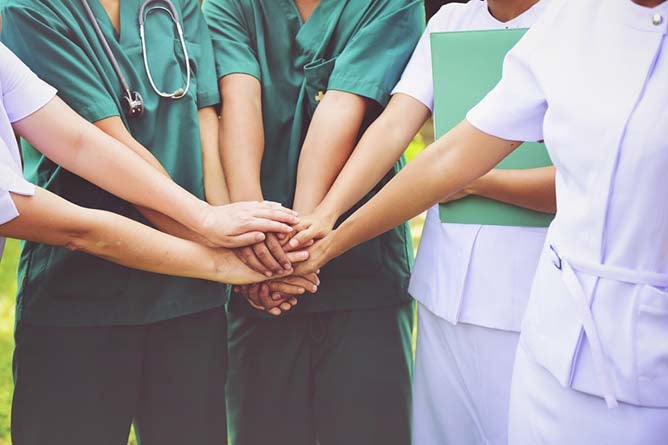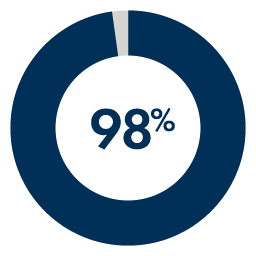Public Health at WGU

Are You Considering a Career in Public Health?
You might have noticed that WGU doesn’t currently offer a public health degree. However, there are many skills that careers in the health field require that can be found in the health-based degree programs at WGU. While not public health degrees, the healthcare degrees offered by WGU have been crafted to help you gain the knowledge, skill set, and educational foundation you need to prepare for a job in public health. Not only will our degree programs help you become a leader in your field, but they will also give you community support through networking and mentorship that can help you start your career. Learn more about the healthcare degree programs WGU has to offer and how they can help you achieve your goal of working in public health.
Pathways to Public Health Careers
A recent search on LinkedIn features listings for over 67,000 public health positions across the United States, including roles such public health jobs as public health analyst, health researcher, public health policy associate, epidemiology program coordinator, and wellness project manager. Each of these roles requires a strong educational background from applicants, but not every public health job requires the same kind of degree. However, the right healthcare degree is important—especially ones that teach strong organizational skills, compassion and patience, the ability to work with and process healthcare data, and more. Luckily, these skills can be found in a variety of healthcare degree programs.
Master of Health Leadership
Like a public health degree, a master’s degree in health leadership is excellent preparation if you want to move into public health, or health policy roles that may encompass healthcare administration. Each of the themes, areas of study, and courses are crafted around the concept of value-based care, balancing informative lessons surrounding the industry and how it works with business knowledge including risk management, information technology, financial management, integrated health leadership, and more.
This degree program is also designed to blend the business side of the industry with a more ethical approach to healthcare, while still maintaining professionalism and strong leadership qualities. Not only is this information important in public health and health policy roles, but this depth of knowledge can also help you move up the professional ladder quickly.
Some of the courses in this degree program include:
- Leadership, Innovation, and Management
- Healthcare Systems
- Healthcare Quality
- Healthcare Analysis
- Community Health
- Integrated themes of Person-Focused Care, Technology, Ethics and more.
MBA - Healthcare Management
If your aim is to effect real change in public health, an MBA in healthcare management will give you the educational background you need. With a stronger focus in business, this degree program can give you important insights that are crucial for some higher-level health administration positions—especially if you already have moved past the entry-level roles in healthcare. And as the healthcare industry continues to change with new regulatory requirements, standards, and expectations, the skills taught in this program will prepare you to become an effective leader who can help navigate these changes and potentially position yourself to have a role in public health programs.
In addition to preparing you with a background in business and strengthening your leadership skills, your MBA will also help you influence decisions in healthcare that could change the future of the industry. You can also learn about operations management, data-driven decision making, global economics, marketing, ethical leadership, and more.
Some of the courses in this degree program include:
- Managing Organizations and Leading People
- Operations Management
- Financial Management
- Service Line Development
- Accreditation Audit
M.S. - Nursing Education (RN to MSN or BSN to MSN)
Both of these degree programs are designed to help you set the future of care as a nursing leader within your community by inspiring other nurses. In the RN to MSN degree path, you can earn both your BSN and MSN to help you expand your impact on patient outcomes by becoming a nurse educator. The program also includes clinical practice experiences such as real-time simulation using immersive virtual reality training and the opportunity to earn the NAHQ (National Association for Healthcare Quality) HQ Principles certificate.
Our BSN to MSN nursing education program is designed to help you thrive as a nurse health educator, giving you critical skills that will prepare you to train the next generation of nurses, impact patient care, and improve health education systems in your community. You’ll learn valuable leadership skills as you develop and implement lifesaving techniques. Plus, you’ll get clinical practice experiences such as real-time simulation using immersive virtual reality training. You can also earn the NAHQ (National Association for Healthcare Quality) HQ Principles certificate.
Some of the courses in this degree programs include:
- Community Health and Population-Focused Nursing
- Evolving Roles of Nurse Educators in Diverse Learning Environments
- Comprehensive Health Assessment for Patients and Populations
- Emerging Trends and Challenges in 21st Century Nursing Education
- Translational Research for Practice and Populations

$48,140
is the average annual salary for public health professionals such as health education specialists and community health workers.
Careers in Public Health
A career in the public health field can be equal parts rewarding and challenging, making it the perfect career path to encourage growth, both personally and professionally. Public health roles are also incredibly meaningful to public health organizations and the communities they serve, offering much-needed care to the public, supporting them through health challenges, and giving them the tools they need to thrive.
To ensure you’re set up for success as a public health professional, public health degree or a degree in health leadership, healthcare management, or an MSN-Education can give you valuable skills and important credentials that can grab the attention of hiring managers everywhere. Getting your degree means you can pursue many different career paths in public health. Having a health-based degree can help you in securing a role at the higher end of the salary scale. Learn more about the variety of health career roles you can choose from once you’ve completed your health degree program.
What Does a Community Health Worker Do?
A community health worker can help community members get the health care that they need, supporting them by providing information, transportation, and even assisting with financial support in some cases. They can also act as a counselor and offer healthcare guidance, in addition to advocating for community healthcare needs.
What Does a Public Health Information Officer Do?
A public health information officer is a public health professional that protects and handles patient data such as diagnoses, symptoms, test results, medical histories, and procedures. In addition to offering consultations on public health issues to the community, they also take charge of communications to keep the public informed of health initiatives and sharing public health data as needed.
What Does a Program Coordinator Do?
Program coordinators do exactly what their title suggests: they coordinate, plan, and oversee their colleagues based on company projects or programs. Think of them as a project manager in the healthcare world, keeping everyone on track to accomplish public health goals.
What Does a Public Health Nurse Do?
Public health nurses wear many hats; they work on improving community health and safety, inform and educate the community about health issues, and more. Their approach to patient care is based on a “whole being” approach, as they don’t just assess health based on the person, but also on their lifestyle and other outside influences.
What Does a Health Services Coordinator Do?
These professionals act as liaisons to help patients interact with their care providers and even insurance companies.
What Does a Nurse Educator Do?
A nurse educator works to elevate, teach, and inspire fellow nurses while also dedicating themselves to patient care. In addition to helping and training junior nurses and nursing students, they also act as an advocate for their colleagues.
What Does a Public Health Researcher Do?
Public health researchers work with community health data, including lab and test results, to understand health trends and risks within the population. The information is then shared with other community health professionals to determine how best to serve the community’s healthcare needs.
What Does a Public Health Educator Do?
A public health educator helps to raise community awareness of sanitary and hygiene, how personal and population-based choices affect community health, and how communities and individuals can contribute to the well-being of the community at large and help reduce outbreaks of disease.
What Does an Epidemiologist Do?
Epidemiology is the study of distribution and causes of disease. An epidemiologist is primarily a research based position. Epidemiologists help inform public health programs by studying health events, the people involved, as well as the place, time and causes of health events.

13%
career growth is expected by 2029 in public health professions.
Why choose WGU?
Why should you pursue a master’s degree that isn’t in public health at WGU? Because we offer:
- Low, flat-rate tuition that charges you the same amount per six-month term, regardless of how many classes you take.
- Competency-based education that allows you to accelerate your program so you can graduate faster (which also saves you money!).
- Scholarships and financial aid to help with our already affordable tuition, making college education accessible for even more students.
The coursework in our healthcare programs is career focused, meaning the skills you learn will translate directly to your work post-graduation.
They're Prepared

97% of employers said that WGU graduates were prepared for their jobs.
They're Top Candidates

95% of employers said they would hire another WGU graduate.
They Wow

98% of employers said WGU graduates met or exceeded expectations.
Source: 2021 Harris Poll survey of 300 employers
Which Degree Should You Choose?
Master of Healthcare Administration
A master's focused on managing comprehensive, value-based care,...
A master's focused on managing comprehensive,...
A master's focused on managing comprehensive, value-based care, directly in line with innovations in health and healthcare.
- Time: 78% of grads finish within 18-24 months.
- Tuition and fees: $4,755 per 6-month term.
Examples of careers and jobs this degree will prepare you for:
- Managed care executive
- Director of integrated care management
- Health center manager/clinic manager
- Director of integrated facilities
Your rich experience in a health-related field can mean more when you bring a master's level of understanding to the problems that organizations need to solve.
Compare degrees
This program is not the only degree WGU offers designed to create leaders in the field of healthcare. Compare our health leadership degrees by clicking the button below.
College of Health Professions
MBA Healthcare Management
Prepare for a career leading private or public healthcare...
Prepare for a career leading private or public...
Prepare for a career leading private or public healthcare organizations.
- Time: Graduates can finish within 12 months.
- Tuition: $4,755 per 6-month term.
Some careers and jobs this business degree will prepare you for:
- President and CEO
- Vice president
- Administrative director
- Chief financial officer
- Other executive-level roles
Healthcare is big business in today's complex economy. Steer your career with this specialty MBA.
Compare online business degrees
This program is not the only online business degree WGU offers that is designed to create leaders in the field of healthcare. Compare our health leadership degrees by clicking the button below.
College of Business
Nursing – Education (RN-to-MSN) – M.S.
This MSN – Education online nursing program for RNs includes a...
This MSN – Education online nursing program for...
This MSN – Education online nursing program for RNs includes a BSN program component and is a substantial leap forward for an aspiring nurse educator.
- Time: 74% of RN-to-MSN grads finish within 42 months.
- Tuition: $4,685 per 6-month term during undergraduate portion; $4,795 per 6-month term during graduate portion.
Sample careers and jobs this online nursing degree will prepare you for:
- Nurse Educator
- Nursing Faculty
- Program Director
- Academic Clinical Nurse Educator
Given the growing nurse educator shortage, earning your MSN with a focus in education is both a rewarding decision and a solid career move.
College of Health Professions
Nursing – Education (BSN-to-MSN) – M.S.
A master's in nursing education program for nurses with BSNs....
A master's in nursing education program for...
A master's in nursing education program for nurses with BSNs.
This degree will prepare you to teach the next generation of nurses.
- Time: 80% of grads finish within 2 years.
- Tuition: $4,795 per 6-month term.
Some careers and jobs this degree will prepare you for:
- Nurse Educator
- Nursing Faculty
- Program Director
- Academic Clinical Nurse Educator
Hospitals and other facilities need nurse educators. Earn your MSN – Education and step into a role inspiring and empowering caregivers.
College of Health Professions
Frequently Asked Questions About a Public Health Career
What Can You Do with a Career in Public Health?
A career in public health is a great way to effect change in your community and give health support and services to those who need it most. With a career in public health, you can care for the community, create policies and communications that can keep the public informed, advocate for patients in need, and more.
Is Public Health a Good Career?
A career in public health is an excellent choice. Not only is it a challenging position that will always keep you on your toes, but it’s also incredibly rewarding, giving you the opportunity to really make a difference in your community.
What are the Best Jobs in Public Health?
There are many jobs you can apply for in public health. Some public health jobs include being a health educator, public health advisor or nurse, program director, and many others. And with the right healthcare degree, you will find yourself with more job options that may make better use of your skill set.
Is Public Health a Useless Degree?
A degree in public health isn’t useless; however, you may find the skill set and educational background you need in a similar healthcare degree, such as a Master of Health Leadership, MBA in health management, or nursing education degrees.
Is a Master's Degree in Public Health Worth It?
A degree is always worth it, especially when it gets you on the path to your dream career! But there are other health degrees that you can pursue that will also support your public health career and other more opportunities for career growth in the future.




